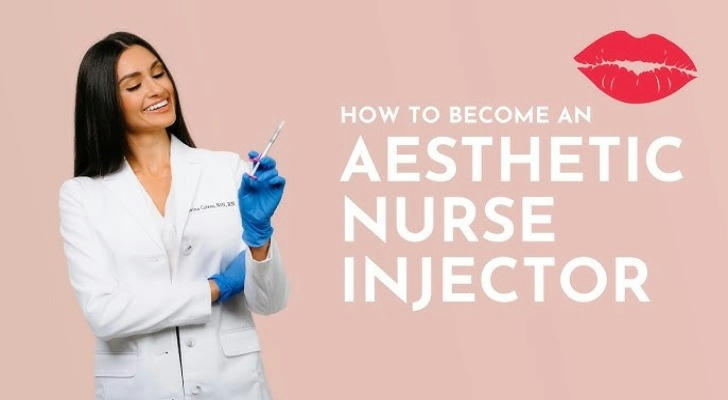How do medical aesthetic nurses obtain licenses and training?
With the rapid rise of the beauty economy, medical aesthetics (Aesthetic Medicine) is not only a choice for consumers to pursue a refined life, but also a new direction for many nursing professionals to transform. As a bridge between medicine and aesthetics, medical aesthetic nurses (Aesthetic Nurse) undertake multiple tasks such as injection, equipment operation, preoperative evaluation and postoperative care, and are indispensable in modern medical aesthetic clinics. 🌟
So, if you want to become a qualified medical aesthetic nurse, what training do you need to go through in the United States? What licenses are required? Today we will answer them one by one, so that you can fully understand every step of this career path.

1. What are medical aesthetic nurses? What do they do? 🧴✨
Medical cosmetic nurses, also known as cosmetic nurses and aesthetic nurse practitioners, are professional nurses who perform cosmetic treatments in dermatology, plastic surgery or medical aesthetic clinics. Their duties include but are not limited to:
- Botox and hyaluronic acid injections
- Laser skin rejuvenation, radiofrequency skin tightening, freckle removal and wrinkle removal equipment operation
- Preoperative consultation and skin assessment
- Postoperative care guidance and complication management
- Assist doctors in facial analysis and aesthetic design
This role requires both medical expertise and aesthetic ability and communication skills. It is a profession that combines professionalism and art✨.
2. The first step to becoming a medical cosmetic nurse: obtaining an RN license 👩⚕️📚
To become an aesthetic nurse, you must first be a registered nurse (RN). This means you need to:
Complete a nursing-related degree program: usually an associate degree (ADN) or bachelor's degree (BSN) in nursing.
Pass the NCLEX-RN national licensing exam: This is the basic threshold for practicing nurses and tests your comprehensive nursing ability.
Obtain a state license and register: Different states have slightly different specific regulations for registered nurses, and local practice conditions must be met.
Only after obtaining an RN license can you be eligible to enter the field of medical beauty for relevant training.
3. How to conduct professional training in the direction of medical beauty? 💡
Although traditional nursing education does not involve medical aesthetics, you can expand your professional skills in the following ways:
1. Take courses related to medical aesthetics
Many institutions offer advanced courses designed specifically for nurses, including:
- Botox and filler injection techniques
- Laser equipment operation and safety procedures
- Chemical peels and microneedle treatment basics
- Facial anatomy and aesthetic assessment
These courses are usually taught by instructors with a medical background, emphasizing practical operation and safety.
2. Internship and clinical experience
Theoretical learning is only the first step, and the most valuable experience comes from actual operation. For example, some new aesthetic nurses will choose to work as internship assistants in medical aesthetic clinics to learn about injections, preoperative evaluations, and instrument control processes.
🎯Case: Jenna is a registered nurse with 5 years of ICU experience. At the beginning of her transition, she interned at a local dermatology clinic for 3 months. Through observation and assistance, she gradually mastered the operation methods of water light needles and fruit acid peels. She shared: "You will never know what you have learned from books. You will know that every needle hole and every observation is a learning experience only after you have practiced."📍
4. What certifications or continuing education are required? 📝🎓
Although most states in the United States do not currently require Aesthetic Nurses to obtain a specific medical beauty license, having relevant certificates will undoubtedly increase professionalism and employer favorability.

Common professional certifications include:
Certified Aesthetic Nurse Specialist (CANS): Issued by the American Society of Plastic Surgery Nurses (PSNCB), you must have a certain amount of medical beauty experience before you can apply.
Laser Safety Certificate
Dermatology, injection training certificate
In addition, many states also require continuing education credits (CEUs) to maintain the validity of the license, so continuous learning is essential.
5. How to find job opportunities? What are the development directions? 📈💼
Medical aesthetic nurses are usually employed in the following places:
- Medical aesthetic clinics or SPAs
- Plastic surgery or dermatology institutions
- High-end clubs or chain medical aesthetic brands
- Mobile medical aesthetic services (such as door-to-door injections)
With the accumulation of experience, the development path of Aesthetic Nurse is very diverse:
| Direction | Content description |
|---|---|
| Injection expert | Specializes in hyaluronic acid, botulinum toxin and other projects |
| Technical supervisor | Responsible for leading the team and training novices |
| Independent opening | After being qualified, you can set up a personal clinic or cooperate in operation |
| Further study NP/PA | Promoted to a practicing nurse and expand the diagnosis and treatment authority |
VI. Common misunderstandings and suggestions💬⚠️
Misunderstanding 1: Only doctors can do medical aesthetics Wrong! In most states, registered nurses can independently perform injections and instrument operations within the scope of authorization.
Misconception 2: You can get a job right away after getting a certificate Practical skills and customer communication skills are equally important. It is recommended to actively seek internship and clinical training opportunities in the early stages of entering the industry.
Misconception 3: This is an easy "light medical" job In fact, Aesthetic Nurse must always maintain a keen sense of anatomical structure, product concentration, and complication prevention. It is a profession with high risks and high responsibilities.
7. Behind beauty is a combination of professionalism and warmth 💖🧠
Medical cosmetic nurses are a profession that combines technology, science and art. They not only use injections and equipment to help others become beautiful, but also use professionalism and patience to make people feel at ease and trust.
If you love nursing, love communicating with people, and want to have a career that combines a sense of achievement and beauty, then becoming an Aesthetic Nurse may be your ideal path.
The future belongs to you who keep improving. May every injection and every consultation be the beginning of lighting up others’ confidence✨💉🌷
